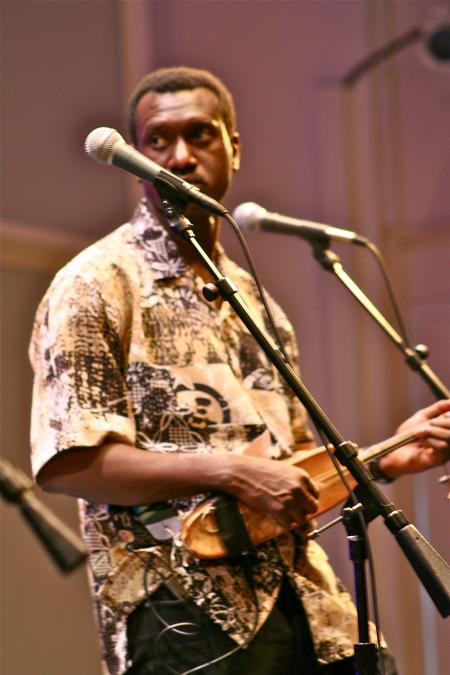It’s been a week since witnessing the
mind-blowing performance by Bassekou Kouyate and Ngoni ba at the Getty in Los Angeles.
And still, finding the words to describe the experience is a challenge.
On this early spring evening from atop
the mountain where the Getty provides the best view of Los Angeles, the scent
of jasmine was inescapable. Pouring down over the city like an aromatic feast,
the beautiful music cascading out from the Getty’s auditorium enhanced the
night air as Bassekou Kouyate and Ngoni ba gave a gripping performance. The
stage was all smiles and fancy footwork as the band cycled deeper into their
zone. Audience members could not contain themselves and filled the edges of the
stage, possessed by the music.
The ngoni is a chilling instrument.
Much like the generations of Kouyate ngoni players before Bassekou, he
captivates his audience with a flawless performance. Leaving the Getty’s
acoustically-addictive auditorium, the buzz was penetrating; comments such as
“astonishing”, “incredible”, “unbelievable” and “best show ever,” still fell
short of accurately describing the magnitude of this performance. As band
members stood for photographs and post-show cigarettes outside of the
auditorium, they seemed un-phased by the magic they created, much like a humble
shaman calmly ushering out the spirits he just conjured.
A predecessor of the banjo, the ngoni
is a stringed african lute instrument. Kouyate comes from a lineage of ngoni
players, bringing the instrument back into Malian fashion (where guitar has
been a dominant force), through not only his mastery, but three members of his
family playing variously pitched ngonis alongside him. He’s even re-fashioned
the ngoni to include deeper bass notes. A former supporting band member for African
legend, Toumani Diabate (who also appears on the album), Kouyate has carved a
niche for himself, his wife and Ngoni ba’s lead vocalist, Amy Sacko, and the
members of the band, which includes Kouyate’s younger brother, Omar, who pulls
the blues out of the ngoni like someone twice his age would only hope to.
I
Speak Fula, the second release from Bassekou
Kouyate and Ngoni ba (SubPop), is a startling meditation. Like its focal
instrument, the album’s eleven tracks are gracefully fierce, recounting a
history spanning hundreds of years, yet totally present. Giving urgent upgrades
to beauty, Sacko sings in Fula, the native language of Mali, weaving in between
the range of ngonis plucking in every direction.
The live performance only cements the
achievement on I Speak Fula. It’s as
critical a work for Kouyate as it is for Sacko, deserving all the accolades and
hype. Kouyate’s tracks will be retooled, remixed and replayed for centuries
forward. Like his family tree of ngoni players, he is indeed weaving a future
out of magic strings.















